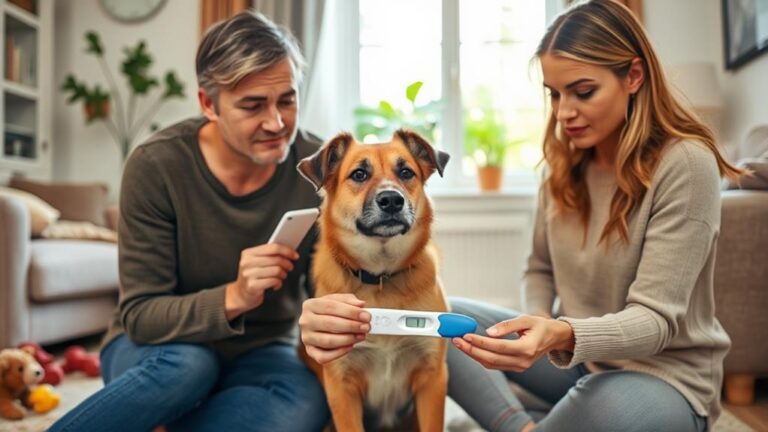The question of whether a pregnancy test can be used on a dog is often posed by pet owners seeking to understand their canine's reproductive health. While various test kits may be available in the market, their reliability is highly questionable compared to veterinary methods. Understanding the signs of pregnancy and the appropriate avenues for testing is essential for responsible pet ownership. Exploring the limitations of home testing and the importance of professional veterinary care raises further considerations. What are the most effective ways to confirm a dog's pregnancy, and how can owners guarantee their pets receive the best support during this time?
Understanding Canine Pregnancy
Understanding canine pregnancy is very important for responsible dog owners and breeders. Canine pregnancy, also called gestation, usually lasts about 61 to 65 days. During this time, the dog's body will start to change, but you might not notice these changes until later.
Unlike people, there aren't home pregnancy tests for dogs. This means you should take your dog to the vet to find out if she's pregnant. A veterinarian can give you a clear answer and offer helpful advice.
In the early stages of pregnancy, you might see some small signs. Your dog may act differently or seem more tired than usual. Some dogs will start to create a cozy spot in your home. This is called nesting, and it means your dog is getting ready to have her puppies.
It is essential for dog owners to learn about these signs so they can care for the mother and her puppies properly. Regular visits to the vet are a great way to keep track of how the pregnancy is going.
The vet can check on the mother's health and make sure everything is developing well. By understanding these basics, you can ensure a safe and healthy pregnancy for your furry friend and her future puppies.
Recognizing Signs of Pregnancy
Recognizing the signs of pregnancy in dogs is very important for pet owners. If your dog is pregnant, you might notice some early signs. One sign is a decrease in activity. Your dog might not want to play as much as usual. You could also see changes in her appetite. Some dogs may experience morning sickness and not want to eat.
Another sign of pregnancy is changes in behavior. Some pregnant dogs become more affectionate. They might want to snuggle and be close to you. Other dogs may prefer to be alone and seek quiet places to rest.
As the pregnancy goes on, physical signs will start to show. The most obvious sign is the enlargement of the abdomen. This means your dog's belly will grow larger as the puppies develop. You may also notice that her nipples get bigger or change color. Weight gain is common, too.
Keep in mind that every dog is different. Some may show signs early, while others may show them later. It's essential to keep a close eye on your dog during this time.
If you think your dog might be pregnant, it's a good idea to visit a veterinarian. They can confirm the pregnancy and provide important advice to help keep both the mother and her puppies healthy.
Available Testing Options
If you think your dog might be pregnant, it's time to look into how to confirm it. Unfortunately, there are no home pregnancy tests you can use for dogs. However, there are special dog pregnancy test kits that you can buy. These kits usually cost around $100 for five tests. They work by measuring certain hormones that show your dog is pregnant.
Another way to find out if your dog is pregnant is by visiting a veterinarian. A vet can do an ultrasound to see if there are puppies developing inside your dog. This can usually be done about 20 to 22 days after mating. It's a safe and effective way to confirm the pregnancy.
If you wait until around day 30, the vet can do a physical exam. This helps to estimate how many puppies your dog might have. Regular check-ups with the vet are really important during your dog's pregnancy. These visits help make sure your dog stays healthy and receives proper care.
Remember, keeping your dog healthy during pregnancy is key. A balanced diet and plenty of exercise will help your dog feel good.
Mating and Pregnancy Insights
Many dog owners might not know that a female dog can get pregnant even if the dogs do not have a mating tie. A mating tie is when the male and female dogs are attached during breeding. This is often seen as a sign of successful mating, but it is not the only way a female dog can become pregnant.
The average time a dog is pregnant, called gestation, is about 63 days. However, this can change a little depending on the dog. In the early weeks of pregnancy, you might notice some signs that your dog is expecting puppies. These signs can include changes in appetite. Your dog might eat more or less than usual. You may also see her seeking comfort more often.
As her pregnancy goes on, she might start showing nesting behaviors, like making a cozy space.
During mating, female dogs might show signs that they are uncomfortable. This can include crying or whimpering. It's important to pay attention to these behaviors. If you think your dog might be pregnant, taking her to the vet is a good idea.
A veterinarian can help by providing the right care. They can also check with an ultrasound, but it's best to wait until later in the pregnancy to see all the puppies clearly. Watching for behavior changes and getting help from a vet can make sure both the mother and her puppies are healthy!
Importance of Veterinary Care
Taking care of your dog during her pregnancy is very important. Dog owners must make sure to get regular veterinary care for their pets. This means visiting the vet to check on the health of the mother dog and her puppies. Before breeding, a vet can help by giving advice on vaccinations, de-worming, and overall health checkups.
When a dog is pregnant, she needs to see the vet often. These visits can help watch how the dog and her puppies are doing. It's also a good time for the vet to find out if there are any problems that could happen.
Vets can do special tests like ultrasounds. An ultrasound shows if the dog is really pregnant and gives an idea of how many puppies she will have. Knowing this information helps the owner get ready for the new puppies.
Veterinary care is not just about keeping dogs healthy. It also makes sure the birth goes smoothly. A vet can help catch any issues early, which can be very important.
Home Testing Limitations
Many dog owners want to know if their dog is pregnant. Some people think they can use home tests to figure it out. Unfortunately, these home testing methods aren't very reliable. Unlike human pregnancy tests, there are no good home tests made just for dogs.
Some stores sell kits that say they can check for pregnancy in dogs. But these kits often give wrong answers. They can tell you your dog is not pregnant when she really is. Or they might say she is pregnant when she is not.
During pregnancy, a dog's body changes, but these changes can be hard to see. Sometimes you need a professional to help figure it out. The best way to know for sure if your dog is pregnant is to take her to the veterinarian. The vet can use special tools, like an ultrasound, to see if the puppies are developing. They can also test for hormones that show pregnancy.
Conclusion
In summary, using a pregnancy test designed for humans on dogs is not effective and can yield unreliable results. Veterinary professionals are essential for accurately diagnosing canine pregnancy through ultrasounds or hormone testing. Recognizing signs of pregnancy can be helpful, but proper veterinary care remains vital for the health of both the mother and her puppies. Ensuring appropriate medical attention during the gestation period supports the well-being of the dog and promotes successful outcomes.



